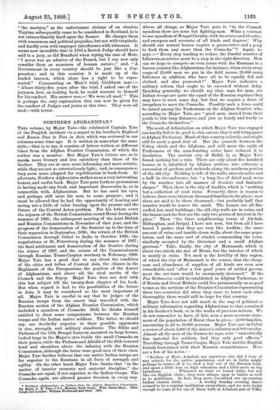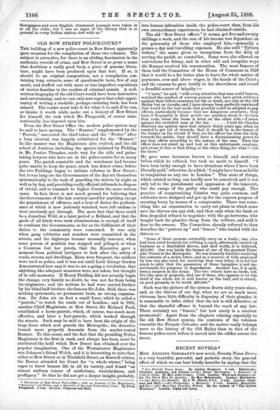NORTHERN AFGHANLSTAN.*
Tras volume, by Major Tate—the celebrated Captain Tate of the Penjdeh incident—is a sequel to his brother's England and Russia Face to Face in Asia, which was reviewed in our columns some time ago. It is written in somewhat the same style,—that is to say, it consists of letters written at different times from the Afghan Frontier Commission, of which the author was a member. But Major Yate's letters are, so to spealft more literary and less epistolary than those of his brother. They are at once more informing and more artistic, while they are not so ostentatiously light ; and, in consequence, they seem more adapted for republication in book-form. At all events, Northern Afghanistan strikes us as a very interesting, honest, and useful book. Major Tate puts forth no pretensions to having made any fresh and important discoveries in, or in connection with, Afghanistan. But he has used his eyes, and perhaps still more his ears, to some purpose ; and it must be allowed that he had the opportunity of hearing and seeing not a little of value bearing upon the present and the future of the Central Asian problem. For his letters cover the sojourn of the British Commission round Herat during the summer of 1885; the subsequent meeting of the joint British and Russian Commissions in November of that year, and the progress of the demarcation of the frontier up to the time of their separation in September, 1886; the return of the British Commission through Cabul to India in October, '1886; the negotiations at St. Petersburg during the summer of 1887; the final settlement and demarcation of the frontier during the winter of 1887, and the return of the Commissioners through Russian Trans-Caspian territory in February, 1888. Major Tate has a good deal to say about the condition of the cities and tribes of Central Asia, the climate in the Highlands of the Paropamisus, the position of the Ameer of Afghanistan, and, above all, the rival merits of the Cossack and the Sepoy. Major Tate does not deal with this last subject till the twenty-first chapter of his book. But when regard is had to the possibilities of the future in Asia, it may be considered as the most important of all. Major Tate is careful to say that he judges of the Russian troops from the escort that travelled with the Russian section of the Afghan Frontier Commission, which included a squadron of Cossacks. Still, he thinks himself entitled to draw some comparisons between the Russian troops and the Indian native soldiers. The latter, we should say, are decidedly superior to their possible opponents in size, strength, and military steadiness. The Sikhs and Pathans of the 11th Bengal Lancers, mounted on large horses, looked huge in the Major's eyes beside the small Cossacks on their ponies, while the Pathans and Afridis of the 20th towered head and shoulders above the infantry with the Russian Commission, although the latter were good men of their class. Major Tate further believes that our native Indian troops are far superior to the Russians in all feats of strength and agility. On the other hand, Major Tate thinks that "in the matter of interior economy and material discipline," the Cossacks are equal, if not superior, to the Indian troops. The Cossacks, again, are allowed greater freedom in every way.
• Northern Afghansstan; or. Letters from the Afghan Boundary Commission. By Major 0. E. Yatc, 0 8 1.. Bombay Staff Corps. With Route Maps. Edin- burgh and Loudon: William Blackwood and Sons. 1983.
Above all things, as Major Tate puts it, "in the Cossack
squadron there are none but fighting-men. What a contrast to our squadron of Bengal Cavalry, with its saisies and bheesties, and sweepers and servants of all kinds and degrees ! Why should our sowars' horses require a grass-cutter and a pony to feed them any more than the Cossacks' "? Again, he
says :—" Every step tending to reduce the fearful number of followers on service must be a step in the right direction. How
can we hope to compete on even terms with the Russians in a barren country like Afghanistan, for instance, when every army
corps of 25,000 men we put in the field means 25,000 camp followers in addition, who have all to be equally fed and clothed, and also protected ?" Major Yale indicates a military reform that ought to be executed without delay. Speaking generally, we should say that, man for man, our Indian troops are quite the equal of the Russian regulars they may have to meet some day, but that we require a force of irregulars to meet the Cossacks. Possibly such a force could be raised among the Turkomans on the Afghan frontier, who, according to Major Tate, are "good men, inured from their youth to ride long distances, and just as handy and hardy as the Cossacks themselves."
The work of delimitation on which Major Tate was engaged can hardly fail to do good to this extent, that it will bring peace to Afghan Turkestan. Much of that country is fertile, and might still be made a good deal of. But the quarrels between the Usbeg chiefs and the Afghans, and still more the raids of Turkomans of the man-hunting order, have reduced it to desolation. The ancient city of Balkh is, as Major 'rate found, nothing but a ruin. There are only about five hundred houses in it, inhabited by Afghan settlers, who cultivate a succession of gardens and orchards along the southern portion of the old city. Nothing is left of the walls, once six miles and a half in circumference, but "a long line of dried mud, worn by the weather into all manner of desolate and fantastic shapes." Then there is the city of Andkin, which is "nothing but a collection of mud rains. Formerly, there is reason to
believe, there were thirteen thousand families in the place ; now there are said to be three thousand,—but probably half that number would be nearer the mark. The houses are all flat-
roofed, low, mud buildings ; the old city-walls are in ruins, and the bazaar and the fort are the only two points of interest in the place." Then "the three neighbouring towns of Akehah. Shibarghan, and Siripal, I have not seen, but from all I have heard, I gather that they are very like Andkin ; the same amount of ruins and tumble-down walls, about the same popu- lation, and the same sort of citadel, commanding the town, similarly occupied by the Governor and a small Afghan garrison." Take, finally, the city of Maimanah, which is about two-thirds the size of Herat, but the interior of which is mostly in rains. Yet such is the fertility of this region, of which the city of Maimanah is the centre, that the cheap- ness and abundance of supplies of all kinds are even now remarkable, and "after a few good years of settled govern-
ment the out-turn would be enormously increased." If the Pax Britannica could be established in Afghan Turkestan, or if Russia and Great Britain could live permanently on as good
terms as the sections of the Frontier Commission representing these two countries did when they came to know each other thoroughly, there would still be hope for that country.
Major Tate does not add much in the, way of political or military information regarding Afghanistan to that contained in his brother's book, or in the works of previous writers. We do not remember to have, of late, seen a more accurate state-
ment of the population of Herat than he gives,-2,000 families, amounting in all to 10,000 persons. Major Irate saw in Cabal a review of about 3,000 of the Ameer's infantry and 800 cavalry. Almost all the men of the former, he says, were "undoubtedly fine material for soldiers, had they only good officers." Travelling through Trans-Caspia, Major Yate and his English friends fraternised with their Russian acquaintances. Here are a few of his notes :—
"Neither at Merv, Askabad, nor anywhere else, did I hear of any schools for the native population, and we in India might perhaps be better off if we took a leaf out of the Russian book, and spent a little less on high education and a little more on big battalions Wherever we went we found clubs, but not like our English clubs ; they were always open to ladies as well as to gentlemen. In fact, they more resembled our up-country
Indian station clubs A weekly Sunday evening dance seemed to be a regular institution everywhere, and we were lucky enough to come in for one of these both at Askabad and at Tiflis.
Newspapers and even English illustrated journals were taken in at all the clubs; but I saw no signs of the library that is so general in every Indian station club with us."



































 Previous page
Previous page